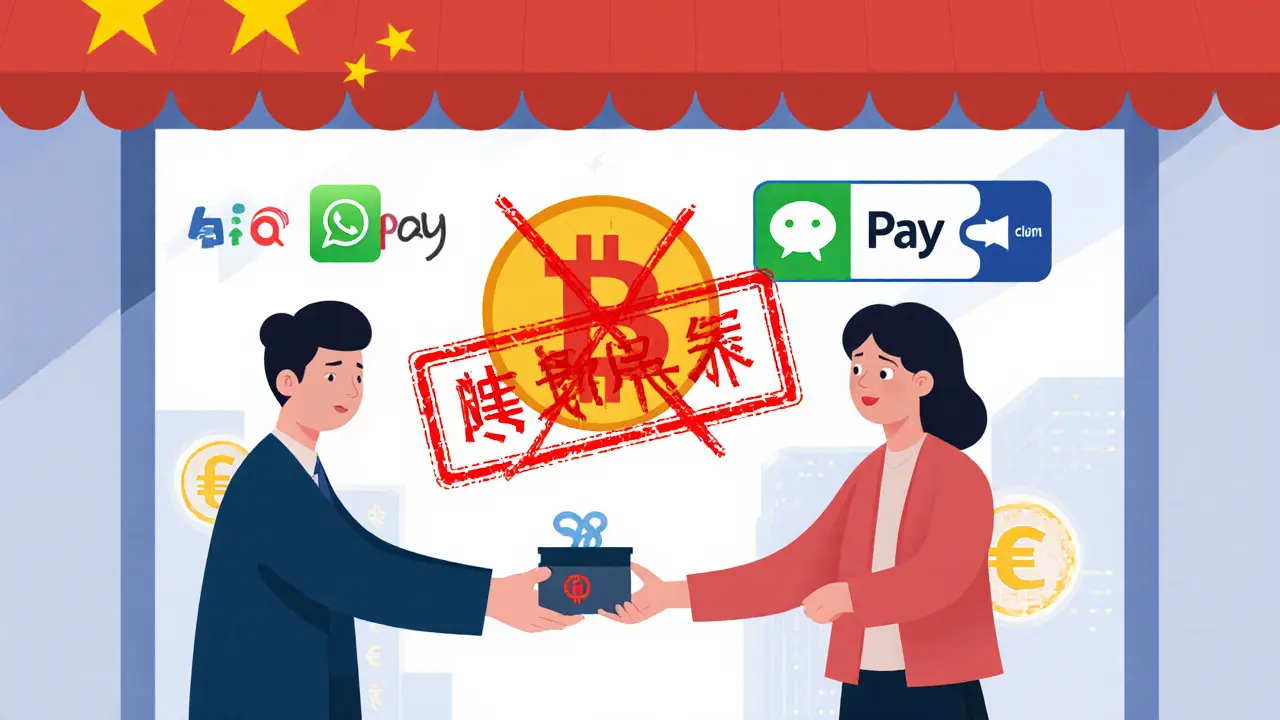Can Businesses in China Accept Crypto Legally in 2025?
 Sep, 2 2025
Sep, 2 2025
Crypto Acceptance Checker for China
Check Crypto Acceptance Status
Enter your business details to check legality status. This tool reflects China's 2025 regulations.
As of 2025, businesses in mainland China cannot legally accept cryptocurrency under any circumstances. It’s not a gray area. It’s not a matter of waiting for rules to catch up. It’s a full criminal prohibition.
What’s Actually Illegal?
The Chinese government doesn’t just ban crypto trading or mining anymore. Since May 30, 2025, holding Bitcoin, Ethereum, or any other cryptocurrency-even if you didn’t buy it-is a criminal offense. That means if your business receives even one Bitcoin as payment for services, you’re breaking the law. Not just violating a regulation. Committing a crime.This isn’t a policy shift. It’s the final step in a 12-year campaign to eliminate private digital currencies from China’s financial system. The People’s Bank of China first warned banks off Bitcoin in 2013. By 2021, all crypto transactions were declared illegal. Then came the mining bans, the exchange shutdowns, the civil court rulings denying crypto claims. And now, in 2025, ownership itself is illegal.
How Enforcement Works
You can’t hide behind tech. China’s financial surveillance system is built to catch this. Banks and payment processors like Alipay and WeChat Pay are required to scan every transaction for signs of crypto activity. If a business receives funds that even look like they came from a crypto exchange, the system flags it. The Ministry of Public Security gets notified. Then comes the audit, the freeze on accounts, the investigation.It’s not just about the money. If your company’s website mentions Bitcoin payments, your domain gets blocked. If your app lets users send crypto, it’s removed from app stores. Even employees who hold crypto wallets on their phones can be investigated if they’re linked to company accounts.
Why This Ban Exists
China isn’t against digital money. It’s against decentralized money. The government wants total control over every yuan that moves through the economy. That’s why it spent over a decade building the digital yuan (e-CNY)-a state-controlled digital currency that tracks every transaction in real time.Cryptocurrencies don’t report to anyone. They can’t be frozen. They can’t be traced back to a single identity. That’s exactly why the government sees them as a threat. If businesses could accept crypto, people could move money out of China without detection. Wealth could escape. Taxes could vanish. The digital yuan can’t be used that way.

What About Hong Kong?
Hong Kong is different. It’s not mainland China. It has its own legal system. Since 2023, Hong Kong has licensed crypto exchanges, allowed stablecoin trading, and even started regulating crypto ETFs. Some mainland businesses set up shell companies in Hong Kong to access crypto markets.But here’s the catch: that doesn’t let them accept crypto in mainland China. If a business in Shanghai takes Bitcoin, even if it’s owned by a Hong Kong entity, it’s still illegal. The ban applies to all operations within mainland borders. Hong Kong’s openness doesn’t create a loophole-it just creates a separate financial zone.
What Happens If You Try?
In 2024, over 300 people were arrested for unlicensed crypto activity. In 2025, those numbers rose sharply. Penalties include:- Immediate freezing of all business bank accounts
- Fines up to 10 times the value of crypto received
- Criminal charges for company owners and financial officers
- Blacklisting from future government contracts
- Forced closure of the business
There are no warnings. No grace periods. No exceptions for small businesses or startups. If you accept crypto, you’re treated like a money launderer.

Alternatives for Businesses
The only legal digital payment option is the digital yuan. It works through apps linked to your ID. It’s fast. It’s traceable. It’s mandatory for government vendors. Many private businesses are now required to accept it, just like cash.If you want to offer digital payments in China, you have one choice: integrate with the e-CNY system. No other option exists. No Bitcoin wallets. No Ethereum contracts. No USDT. No stablecoins. Not even decentralized apps that claim to be "non-crypto."
Global Contrast
While China shuts down crypto, places like Singapore, the U.S., and the UAE are building frameworks to regulate it. The U.S. passed clear rules in early 2025. Singapore finalized its stablecoin rules. Even South Korea now licenses crypto exchanges.China’s approach is the opposite. It’s not about balancing innovation and risk. It’s about eliminating competition to state control. That’s why it’s not just a financial policy-it’s a political one.
What’s Next?
Don’t expect this to change. The digital yuan is now embedded in China’s tax system, social credit programs, and public services. Reversing the ban would mean giving up control over the financial flow of 1.4 billion people. That’s not happening.Businesses operating in China today must treat cryptocurrency the same way they treat illegal drugs: zero tolerance. Any attempt to accept it-even as a gesture or experiment-risks everything.
The message is clear: in mainland China, money belongs to the state. Everything else is illegal.
Kris Young
November 20, 2025 AT 16:55This is crystal clear. No gray zones. No loopholes. If you take crypto in China, you’re breaking the law-full stop. The government isn’t playing around. They’ve spent over a decade building this system, and they’re not turning back. The digital yuan isn’t just a payment tool-it’s control. And they won’t let anything else compete.
LaTanya Orr
November 21, 2025 AT 06:33It’s not just about money it’s about power. The state doesn’t want people to have financial autonomy. Crypto is freedom in code and freedom scares centralized systems. The digital yuan tracks every coffee you buy. Crypto doesn’t answer to anyone. That’s why it had to go. Not because it’s dangerous-but because it’s independent.
Ashley Finlert
November 22, 2025 AT 20:27The irony is breathtaking. China is building the most advanced surveillance state in human history-under the banner of financial stability. They call crypto a threat, yet their own digital currency turns every citizen into a data point. Where does sovereignty end and surveillance begin? In China, the answer is simple: never. The state owns your money, your movements, your choices. And now, even your digital footprints are taxed.
Chris Popovec
November 24, 2025 AT 06:29Let me break this down for the sheeple. This isn’t about regulation-it’s a full-on financial coup. The PBOC doesn’t want you to have access to decentralized assets because if you did, you’d realize the digital yuan is just a blockchain with a dictator at the node. They’re scared of peer-to-peer. Scared of censorship resistance. Scared that people might figure out that their money isn’t theirs. The arrests? PR theater. The real goal is to lock everyone into a single, traceable, surveilled monetary system. Welcome to 1984 with QR codes.
Marilyn Manriquez
November 25, 2025 AT 09:04For businesses operating in China, the path forward is unequivocal. The digital yuan is not merely an option-it is the sole legitimate channel for digital financial interaction. To deviate from this standard is to invite profound legal and operational consequences. The integrity of the financial ecosystem depends on adherence to state-mandated protocols. There is no alternative that aligns with the rule of law.